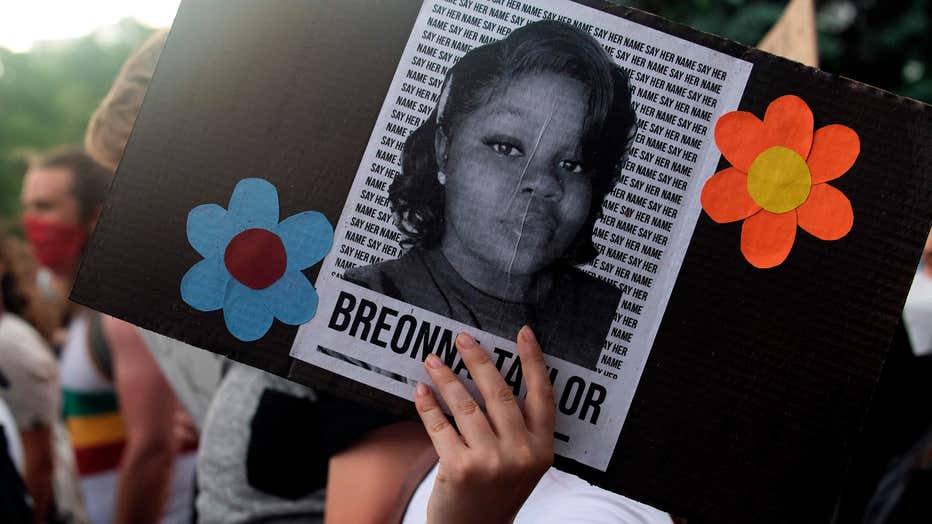On what would have been Breonna Taylor’s 27th birthday, here is where her case stands
LOUISVILLE, Ky. - June 5 would have been Breonna Taylor’s 27th birthday, but her life was cut short when she was killed on March 13 by police who had broken into her house with a “no knock warrant” in search of illegal drugs at Taylor’s home in an apparent case of mistaken identity.
What happened to Breonna Taylor
Taylor, an EMT, was shot eight times by three narcotics detectives who knocked down her front door while attempting to enforce a search warrant that named another suspect, Jamarcus Glover, who did not live at Taylor’s residence.
No drugs were found in the home. Police defended their use of force by saying they were returning fire after one officer was shot in the apartment and wounded.
A defense attorney for Taylor’s boyfriend, Kenneth Walker, argued in court filings that Walker fired in self-defense because police did not announce themselves and he thought it was a burglary. Taylor and Walker had no criminal history or drug convictions. Walker had even called 911 during the break-in, according to his attorney.
Walker was charged with attempted murder of a police officer, but the case was later dropped.
RELATED: Witness: George Floyd didn't resist arrest, tried to defuse things
The police officers involved
The officers involved in Taylor’s death were plainclothes police detectives. They were not charged with a crime and were placed on administrative leave.
Taylor's death sparked a national uproar and calls for federal intervention. Activists have highlighted her death alongside that of other African Americans who have died at the hands of police, including George Floyd, who died during an encounter with Minneapolis police on May 25.
Public vigils were held across the country on Taylor's birthday condeming police brutality and racial injustice.
Many high-profile figures, including California Sen. Kamala Harris, have called for a federal investigation into the shooting death of Taylor by police. An online petition calling for “justice for Breonna Taylor,” which has garnered more than 4.2 million signatures, alleges that police performed an “illegal, unannounced drug raid” on Taylor’s home.
The petition calls for charges to be brought against the officers involved in the shooting.
Taylor's family hired prominent civil rights and personal injury attorney Ben Crump to handle the case. Crump has represented the families of other black shooting victims, including Ahmaud Arbery, who was fatally shot in February on a Georgia residential street, and George Floyd.
RELATED: Councilmembers vow to 'dismantle' Minneapolis Police Department, emergency meeting set
A wrongful death lawsuit filed by Taylor’s family in April said Taylor “had posed no threat to the officers and did nothing to deserve to die at their hands.” The suit also alleged police had already located the drug suspect they were seeking, Jamarcus Glover, at his home and detained him before executing the warrant at Taylor’s residence.
The ‘no-knock warrant’
The Courier Journal reported that Taylor's address was listed in a search warrant based on the investigator’s belief that Glover used her home to receive mail, keep drugs or stash money earned from drug sales. Police investigators said they had earlier observed the drug case suspect, Glover, taking a package from Taylor’s home and driving to a “known drug house,” the newspaper reported.
The warrant was a “no-knock,” meaning police were not required to identify themselves before entering the home, the Courier Journal reported. Louisville police have said they did identify themselves to the home's occupants, but some neighbors said they heard no such warnings, according to the lawsuit filed by Taylor's family.
Louisville Mayor Greg Fischer has faced pressure from protesters calling for the firing of the officers involved in the raid leading to Taylor's death. He said he can't legally fire police officers, pointing to state law and the collective bargaining agreement with the police union, which lays out a process to fire officers.
“If an officer is fired outside of that process, the officer can appeal, will appeal, to get their job back immediately, with back pay and even damages and have a platform then to sue the city for wrongful termination," Fischer said recently.
Fischer, however, announced the firing of Police Chief Steve Conrad on June 1, after he learned officers involved in a separate police shooting that killed David McAtee during police brutality protests failed to operate their body cameras.
Crump said Conrad’s departure is “is a significant step forward in getting justice for Breonna Taylor, her family, and the city of Louisville.”

FILE - A demonstrator holds a sign with the image of Breonna Taylor, a black woman who was fatally shot by Louisville Metro Police Department officers.
An FBI investigation and changes to police policies
On May 21, the FBI announced that it had started an investigation into Taylor’s death.
Just days before the FBI’s announcement, and nearly two months after Taylor’s death, Fischer announced that Louisville police would be required to wear body cameras and the department’s “no-knock” policy on search warrants would be changed.
“These changes, and more to come... should signal that I hear the community and we will continue to make improvements anywhere that we can,” Fischer said.
Fischer said the police chief will now need to sign off on those types of warrants before they are sent to a judge for approval.
Plainclothes units like the one that served a warrant at Taylor’s home will also now be required to wear body cameras during the execution of search warrants.
On June 3, Fischer announced that the city of Louisville would be "issuing a request for proposal for a comprehensive, top-to-bottom review" of the police department, according to the Courier Journal.
The Associated Press contributed to this story.

